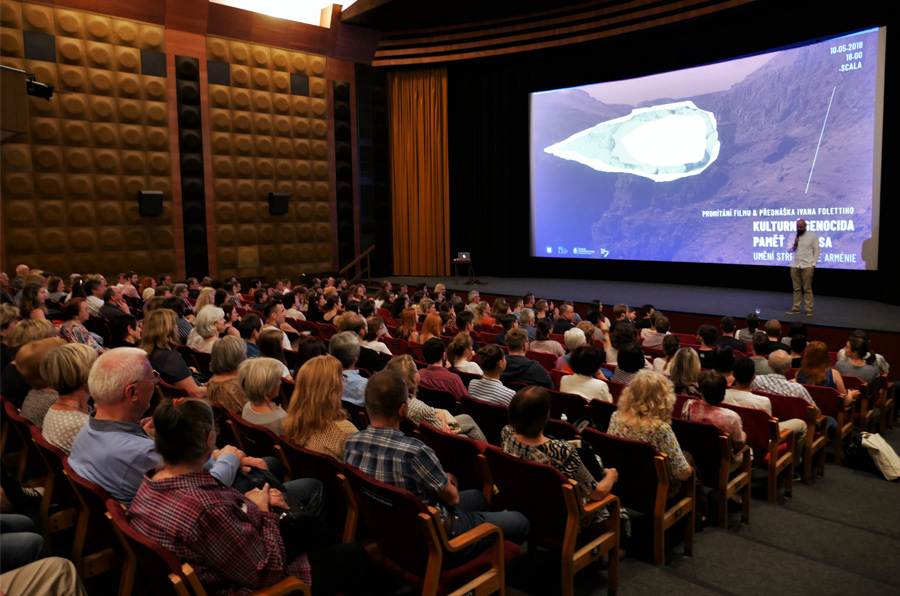
ON CULTURAL GENOCIDE, MEMORY AND BEAUTY: THE ART OF MEDIEVAL ARMENIA
May 10, 2018
A Report
The event, which took place at the university cinema of Scala in the early evening of May 10th, was marked by a shared consideration about the beauties of the Caucasus. The students of the Centre for Early Medieval Studies were trying to convey their experiences which they have gathered during several field trips into the region since 2016 to the attendees. In particular, they presented various pieces of information about Armenia – a country with a rich cultural history.
After screening of a short documentary movie, and recitation of a poem, a lecture followed presented by Ivan Foletti. In addition, the program was amended by a photo exhibition, so that the visitors could view the Armenian cultural heritage from a variety of viewpoints.
AS OBSERVERS
The visitors were first cought by a thematically-arranged foyer of the cinema. The room was decorated by a number of photographs secured on stands as well as directly on the walls. The actual images on display not only captured the art historians during their field trips, but also details of architecture and landscape of the regions visited. The visitors could walk from picture to picture, adding to their expections about the start of the program itself.
AS VIEWERS
The auditorium of the cinema was slowly filling up, and soon it became certain that the room will not remain empty. The program began with a short speech by Ondřej Jakubec, Head of the Department of Art History. After that, the lights in the room went off, and the screening of the short documentary movie started. The movie introduced the basic architectural features to be found in Armenia. Thanks to a slow, almost meditative, rhythm of the movie, the viewers had plenty of time to examine the individual works of art, and to realize their immense variety. The movie also focused on depicting Armenia as a crossroads of a number of cultures and highlighted the fact that it had been the constant exchange with all of the cultures coming and going – from Persian to Byzantine to Osman – that contributed to the establishment of the unique and peculiar Armenian architecture.
AS LISTENERS
After the visual experience, the visitors were exposed to another, no less compelling stimulus: the recitation of the poem Ancient Achtamar by a contemporary Armenian poet, Ikna Sariaslan. For this paticular occasion, the poem had been freely translated to Czech by Jan Hanuš. The words of the poem made it possible for the listeners to approach Armenian monuments by yet another means, which was nor informative nor formal, but which awoke their emotions. Through the poem, the listeners had the opportunity to appreciate how important a cultural monument may be (not only) for the Armenian nation, and to contemplate the perception of beauty in something as ordinary as mere stones.
AS EXPLORERS
The last part of the evening was devoted to the lecture by Ivan Foletti. In the first moments after the lecture had started, one of the visitors made alert one of her friends that it was going to be an exhaustive influx of information. As it turned out, she was completely right. The listerners were presented with a number of topics ranging from a contemplation about the artistic value of monuments to the questions of cultural genocide. What became an important moment of the whole lecture were the parts reminding us about the intentional destruction of the monuments in the medieval Armenian city of Ani and its premises, currently located within the present-day Turkish territory.
After the program had finished, the visitors had the chance to stay in the foyer of the cinema to meet with the students and have a chat over a glass of wine. We hope that those who had only come with patchy perceptions about Armenia were leaving with a plethora of fresh pieces of information. And we also hope that the visitors and guests were leaving the Scala cinema with loads of new questions, and a sparked interest to get to know Armenia as well as the whole Caucasus region far more profoundly.
Gajane Achverdjan


